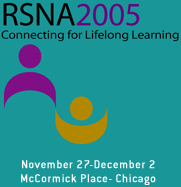
Abstract Archives of the RSNA, 2005
Mark W. Anderson MD, Presenter: Nothing to Disclose
Michelle S. Barr MD, Abstract Co-Author: Nothing to Disclose
Christopher Gaskin, Abstract Co-Author: Nothing to Disclose
Bennett A. Alford MD, Abstract Co-Author: Nothing to Disclose
A GLAD lesion (glenolabral articular disruption) has been described previously along the anterior-inferior aspect of the glenoid. We have identified a similar lesion involving the posterior-inferior glenoid
(Posterior GLAD lesion).
Using a computer keyword search, 13 patients with focal labrocartilaginous lesions of the posterior glenoid were identified. MR arthrograms were reviewed and compared with clinical information and surgical findings when available (6/13 patients).
All 13 patients demonstrated a focal cartilage defect (average size = 30 mm2) involving the posterior inferior glenoid between the 7 and 9 o'clock postions (10/13 at 8 o'clock). Posterior labral pathology was seen in 6/13 patients and posterior capsular abnormalities in 5/13. No anterior labral pathology was identified in any of the patients. Focal marrow edema was identified in the anterior humeral head in 3/13 patients and 3/13 patients were also found to have a single loose body. 8/13 patients presented with a history of trauma or instability/dislocation. There was correlation of MRI and arthroscopic findings in 5/6 patients (focal chondral disruption/wear as well as labral pathology). In the other patient, no labrocartilaginous abnormality was found.
Focal cartilage defects of the posterior glenoid (Posterior GLAD lesions) occur in a consistent location, are often associated with other posterior labrocapsular pathology, and occasionally with intraarticular loose bodies. Focal contusions in the anteromedial humeral head in three patients suggest that this injury may result from an impaction force that occurs when the humerus is internally rotated.
Anderson, M,
Barr, M,
Gaskin, C,
Alford, B,
Posterior GLAD Lesions of the Shoulder. Radiological Society of North America 2005 Scientific Assembly and Annual Meeting, November 27 - December 2, 2005 ,Chicago IL.
http://archive.rsna.org/2005/4416043.html

